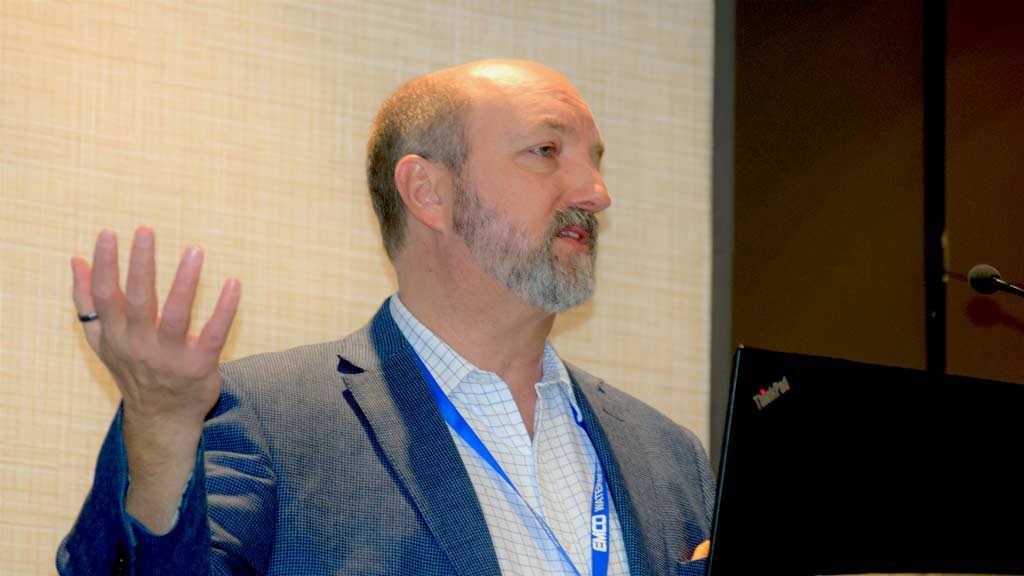Ontario’s utility locates system has come a long way since the tragic 2003 Bloor Street gas explosion and fire in Toronto that killed seven people and spurred reforms in utilities regulations and the institution of the Ontario One Call system.
But as Own Your Safety president Grant Piraine told delegates attending the Ontario Sewer and Watermain Construction Association (OSWCA) conference held in Blue Mountain, Ont. recently, the system still has huge gaps. In fact, he said, some sectors are essentially unregulated, meaning public and worker safety remain a significant concern.
Piraine’s Feb. 10 presentation was titled Utility Locates Challenges in Ontario. He highlighted multiple differences between public and private locates in the province.
Utilities locates on private lands are barely regulated, Piraine told the delegates.
“There is no trade association, no regulations,” he explained in an interview after the presentation, noting private locates are only regulated by Ontario Regulation 213/91, Section 228, “which says that all facilities must be marked. It doesn’t say located, it says marked.
“It doesn’t say who has to mark them, it just says mark them. So, you can buy a locate set tomorrow and go mark them. I am sure the Ministry of Labour would want to see a proper private locate, but what is a proper private locate? Anybody can buy a set and call themselves a locator. It’s just an unregulated industry, and you have to hope you are hiring someone who is qualified.”
The locates sector is in its infancy across Canada, Piraine noted, and even though Ontario may be a wild west, he said, it’s the best-regulated underground utilities jurisdiction in Canada. There were 1,281 facility strikes in 2018 in Ontario in cases where no locates were conducted, according to one report, and even when there were locates undertaken, there were 3,761 strikes.
Damages were estimated at $650 million in Ontario that year.
Piraine is co-chair of the best practices committee of the Ontario Regional Common Ground Alliance (ORCGA), Ontario’s locates advocacy group. The ORCGA’s Dirt 2018 report explains that for underground utilities on public lands, utility owners are required under the Ontario Underground Infrastructure Notification System Act to provide mapping to the One Call Service. But underground utilities located on private property are not subject to the notification requirements under the act.
“Private property owners do not have to submit mapping of underground utilities located on their property prior to purchasing the property,” states the Dirt report. “In addition, it is not typical for homeowners to create as-builts or map newly installed underground infrastructure that can be passed on to the next property owner.”
Besides the minimal legislation governing private utility locates, Piraine said, other challenges in the province include lack of enforcement of what legislation there is, inaccurate records, poor locate technology — some of it is decades old, he said — poor property records, high stress on poorly paid locators, high volumes during the busy season, and poor locator training.
Piraine recommends that, in the absence of proper regulation, stakeholders act on their own to improve practices. OSWCA members, he said, should take steps to educate their workforce; ensure private locate contractors they hire are properly qualified; prepare plans with property owners before hiring locators; review in detail the private locate reports they obtain in comparison to site conditions; and respect the marks on the ground and limitations contained in the locate report.
Piraine has written a best practices document and said he believes the government must be enlisted to improve regulation. In the meantime, he will continue to work with the ORCGA and take on speaking invitations with construction sector stakeholders such as the OSWCA to preach for better accountability.
“Whether or not that gets traction, I have no idea,” said Piraine of his best practices document. “It will probably be a question of “what” — you must get private locates but it doesn’t tell you how to get them and how to manage yourself on private property. I think the landowners and owners need to have a voice, but they don’t. There is no big push on the private side to educate people, other than myself getting up to give these talks.”











Recent Comments